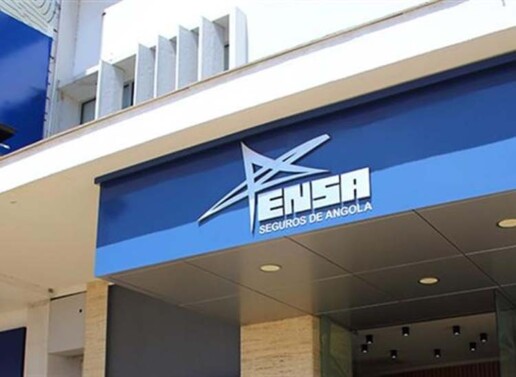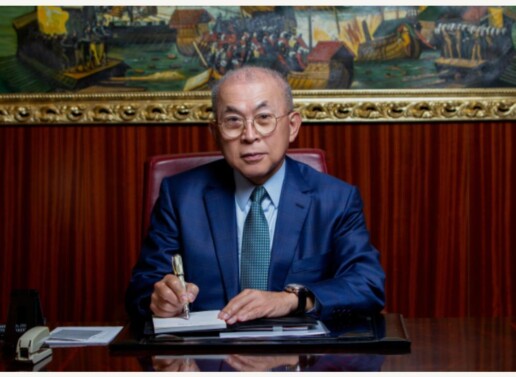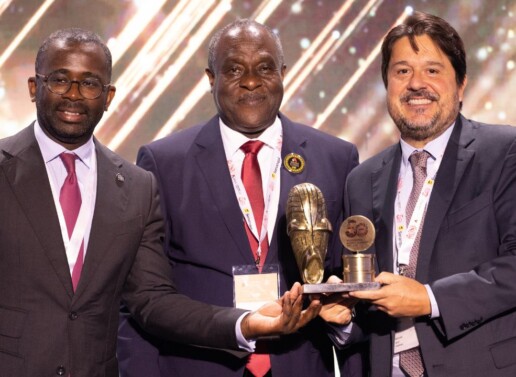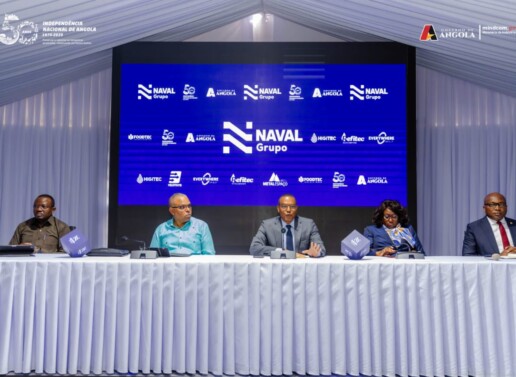Candidate for IL leadership spent 13 years at Sonangol’s Portuguese company, three as a board member. Prosecutor investigates purchase and sale of a building in Lisbon. Leitão says she had no responsibility in the area.
Before entering active political life, Mariana Leitão built her professional career in a single company: Puaça, a Portuguese subsidiary of the Angolan state oil company Sonangol. Her role in the company, over the 13 years and five months she worked there, would often be influenced by the political situation in Angola. And it may now bring her political problems due to her connection to a regime that has been considered corrupt, with Sonangol seen as the main vehicle for the improper distribution of wealth and a tool for maintaining José Eduardo dos Santos, the country’s former President, in power.
The sole candidate for IL leadership joined the company in 2005, when Angola’s former Vice President, Manuel Vicente, was in charge of Sonangol. Years later, she would be removed from Puaça’s board when there was a leadership change at the company, with Isabel dos Santos being appointed by her father, José Eduardo dos Santos, to lead the Angolan group. She eventually left in 2019, after the newly elected Angolan President, João Lourenço, sought to restructure Sonangol, focusing it more on its core business, oil, reducing Puaça’s activity.
Before joining the board of directors, Mariana Leitão was operations director of Sonangol’s scholarship program — which aimed at staff training — coordinating the stay of Angolan scholarship students in Portugal. But the company had other business areas with greater financial impact. Puaça — still active today, although with minimal turnover — also had a stake in a travel agency, Atlântida, and operated in the real estate market. It is here that there is a particular transaction that is being investigated by Portuguese justice.
The Public Prosecutor’s Office opened an inquiry into the purchase and sale, by Puaça, of a 27,000 square meter building located at numbers 5 to 7 Avenida da República, in Saldanha, Lisbon, an official source from the Attorney General’s Office (PGR) confirmed to Observador. In 2009, during a counter-cycle for the real estate market, the unfinished building was purchased for around €38.5 million. Twelve years later, without the construction having been completed, Puaça sold it for only €30 million.
The PGR does not reveal the reasons that led to the opening of the investigation, nor the suspicions involved, but adds that “there are no defendants in the inquiry, so it is not possible to confirm any name” targeted in the process.
Mariana Leitão denies “any responsibility, influence, decision or participation” in the purchase and sale of the Puaça building on Avenida da República. And states: “I never reported directly to Manuel Vicente or Isabel dos Santos. In the performance of my duties, I had no contact with them. Nor after leaving Puaça.”
The liberal MP stopped working at Puaça in 2019, precisely the year the building was put up for sale. And she was no longer working at the company when, in 2021, the building was finally sold, after six proposals had been rejected, according to Jornal de Negócios. At the time of the building’s purchase, in 2009, Mariana Leitão was operations director and held “administrative and financial management” functions, as can be seen on her LinkedIn page. However, the liberal MP assured Observador that “at the time of the building’s purchase, [she] had no responsibilities in any other area of the company than managing the scholarship program.”
The rise of Mariana Leitão at Puaça
In August 2005, Mariana Leitão completed her degree in International Relations and Political Science at Universidade Lusíada de Lisboa with a final grade of 13 out of 20. After a one-month internship at the newspaper Semanário, in October she began her career at Puaça, at the age of 23. “I sent my résumé, did several interviews, and got the job, having been hired. I started as an administrative assistant,” she told Observador.
Mariana Leitão’s father, lawyer António Leitão, is said to have worked with then Sonangol president Manuel Vicente, according to two Angolan sources who spoke to Observador on condition of anonymity. Asked by Observador, Mariana Leitão did not respond whether she already had any connection with Puaça or the Sonangol group prior to being hired. As for her family’s ties with the second most powerful man in Angola at the time, she says: “I am not in a position to comment on the past professional activity of my late father.”
Armindo Pires, a personal friend and representative of Manuel Vicente in Portugal, who was on Puaça’s board at the same time as Mariana Leitão, admits that he was a “personal client of the office” of the candidate’s father. “I’m not sure whether António Leitão worked for Sonangol and I don’t believe he worked with Manuel Vicente,” says the lawyer. Asked whether he took Vicente’s affairs to António Leitão’s office, Armindo Pires reiterated only that he was a “personal client” of Leitão and that he was Manuel Vicente’s representative “only for moving funds and little else.” On the other hand, he assures that he only met Mariana Leitão in 2013.
Armindo Pires was accused in February 2017 of the crimes of active corruption, money laundering, and document forgery (in co-authorship with Manuel Vicente) in the context of Operation Fizz — a case that led prosecutor Orlando Figueira to prison for having been bribed by Angola’s former President. Later, in December 2018, Pires was acquitted of all charges by the first-instance court.
In February 2007, less than two years after joining the company, Mariana Leitão was promoted to operations director of Sonangol’s scholarship program. “At the time, Puaça had an external company managing the program for Sonangol’s Angolan scholarship holders and wanted to internalize this function. I was the one to manage the program. It was about bringing scholarship students from Angola to study in Portugal, managing their placement in universities, their accommodation, their academic performance, generating reports on their academic profile, seeking to provide an education and a new life to many young Angolans who otherwise wouldn’t be able to study.”
The liberal MP explains that, with the increase in the number of scholarship students, “it became necessary to expand the team and hire more people,” and that her promotion was justified by the growth in the company’s structure and responsibilities. “At the peak of activity, there were around 200 Angolan scholarship students studying in various Portuguese cities,” she notes.
A year later, in December 2008, the company changed from a limited liability company (Lda.) to a public limited company (S.A.), the share capital increased to five million euros, and Mariana Leitão became a shareholder with 100 euros and joined, for just over two months, the board of directors.
In 2013, the liberal would join the board again — this time for a longer period. She was appointed as a board member at Puaça at the same time as Armando Pires. She would leave in 2016, when what was then considered the richest woman in Africa, the eldest daughter of José Eduardo dos Santos, arrived. “After Isabel dos Santos was appointed president of the board of Sonangol, a new board of directors was appointed at Puaça and I stopped being a board member, keeping my role as director,” she told Observador.
On her LinkedIn profile, the liberal does not distinguish between her roles before and after 2016. According to her post, between 2013 and 2019 she was responsible for “developing and executing comprehensive policies, goals and business strategies; providing strategic advice to the board of directors; preparing and implementing business plans; carrying out and controlling budgets; monitoring and controlling the progress of all activities (financial performance, investments, and quality).”
In response to a question from Observador, the PGR clarified that in the inquiry related to the purchase and sale of the Saldanha building, the investigation “does not focus” on the period between 2013 and 2019. But it does not clarify which period is under analysis.

Mariana Leitão is a candidate for the leadership of Iniciativa Liberal
Sonangol wanted a headquarters in Portugal but sold it €8.5 million below purchase price
During most of Mariana Leitão’s time at Puaça, the building on Avenida da República was by far the company’s most valuable investment. The purchase of the property had attracted some attention the year it was made. In 2009, following the subprime crisis in the U.S., Portugal was going through the second year of a significant real estate market downturn.
At that time, in addition to being unfinished, according to Jornal de Negócios, the property did not have a usage license. Even so, Puaça decided to invest €38.5 million, aiming to concentrate in that space several Angolan companies linked to the Sonangol group that had investments in Portugal. It was intended to be Sonangol’s headquarters in Portugal, in the heart of Lisbon. In 2010, the company’s share capital rose to €40 million.
An investment of this scale had major significance in the national real estate market at a time of weak investment in the sector in the country, which was undergoing a deep economic crisis. According to the same newspaper, in the year prior to the purchase, the total amount of large real estate transactions in the country was around €500 million, with an average value of less than €10 million. However, according to a 2019 estimate, if the building had been ready for use, it would have had a potential value of more than €60 million. That did not happen. Puaça made changes to the project and began construction, but the works would be suspended in 2015.
With João Lourenço’s rise to power in 2017 and the implementation of his Privatization Program (Propriv), the building was identified as one of the Sonangol group’s assets to be disposed of and was urgently put up for sale in 2019. After at least six proposals were rejected, the property was sold, in 2021, for €30 million, to the British investment fund Signal Capital Partners. A value well below the purchase price.
Strategic reorientation of Sonangol and Puaça’s “unviability” led to Mariana Leitão’s departure
Although this property was the company’s largest asset, it was the management of Sonangol’s international scholarship students that required the greatest workload. The assessment comes from Puaça’s own board of directors, as can be seen in a copy of the collective dismissal process of eight workers. This process was sent to the Commission for Equality in Labour and Employment (CITE), in order to request a prior opinion on the dismissal of a worker who had just given birth and another who was still breastfeeding.
In this document, dated late 2018, Puaça’s management states that, since 2016, Sonangol’s “staff training strategy” has “been changing,” causing a “very negative direct impact” on Puaça’s activity. From that year on, the number of scholarship students received annually by the company became “merely symbolic,” after the Angolan oil company decided to transfer the responsibility for managing Angolan students in Portugal to another company, effective from November 1, 2018.
Mariana Leitão explained to Observador that the end of the scholarship program “led to the elimination of the job positions of the people who worked on it,” including her own. However, the liberal, who at the time was part of the company’s management, guarantees that the “process was carried out normally, with all the rights, deadlines, and compensations provided by law being ensured.”
To justify the elimination of jobs, Puaça’s board also explained that “in the last five years most of the real estate” held by the company had been sold. Regarding these real estate assets, the suspension in 2015 of work on the Avenida da República building is highlighted — “the only real estate project that was in progress” — and the decision to dispose of it “as it was.”
Mariana Leitão explained to Observador that this was a “decision made by the shareholder, at the time related to the economic crisis being experienced in Angola” — from 2014 onwards, with the fall in oil prices, the country entered a difficult period. Although she claims to have had “no responsibility, influence, decision or participation” in the purchase and sale of the building, the IL parliamentary leader says she was “part of the team for its redevelopment and requalification, which involved managing suppliers, architects, and construction deadlines.”
The reduction of the company’s real estate assets and the drop in services provided to scholarship students led to losses at Puaça, at a time when it was already “struggling with economic and financial imbalance.” This situation led to the “unviability of the company due to lack of financial means, as the shareholders did not intend to continue financing the company,” according to the dismissal process. However, Puaça, now 30 years old and with a share capital of €40 million, has not yet been privatized, and remains active, registered under the economic activity of buying and selling real estate.
Connection to the company of “Mr. Oil,” a “nightmare for the liberal”
Mariana Leitão’s connection to the powerful Angolan “state-enterprise” and one of Angola’s richest men may become problematic. And not only for the sole candidate for IL leadership, but also for the party itself, says Paula Cristina Roque, an expert in African studies. “It’s not a good record for Mariana Leitão, her relationship with Manuel Vicente, who Portugal considered to be corrupt, and whose case is still ongoing in Angola. This connection to the corrupt Angolan power, to a regime known worldwide for its nepotism, that enriched an elite while leaving the majority of the people poor or starving, with no healthcare or jobs, can only be a nightmare for the liberal,” laments the researcher from the Centre of African Studies at the University of Oxford.
“Unless she shows that during the years she was in the company, there was nothing questionable, no irregularities,” Paula Cristina Roque emphasizes. If that doesn’t happen, there is the risk that “the party itself becomes hostage to Mariana Leitão’s past,” stresses the executive director of Intelwatch, a non-profit organization dedicated to strengthening public and democratic oversight of state and private intelligence services in Southern Africa and beyond.
No one has forgotten the “Bermuda Triangle”: Sonangol created an offshore mechanism that allowed the Angolan elite to appropriate large sums of money, creating a hole in public accounts of about €4.22 billion.
There is always a political issue that may be subject to scrutiny. This is the line that Observador columnist Rodrigo Adão da Fonseca followed. The businessman, who worked in Angola, wrote in a recent opinion piece that Mariana Leitão has a trajectory “incompatible with the minimum requirements expected” for the leadership of a party that calls itself liberal. The specialist in cybersecurity and data protection says he cannot “rationally conceive how someone who for thirteen years carried out — without discomfort and surely with some myopia — duties (…) within the sphere of such a sinister state-owned company as Sonangol, has the profile to give coherence to IL’s message and take the party further than her predecessors.”
Mariana Leitão arrives at Puaça in Angola’s “golden years”
Mariana Leitão arrived at Sonangol in Angola’s “golden years”, when the economy was growing at double-digit rates, the “petrodollar” euphoria was in full swing, and the excitement of rebuilding the country provided fertile ground for many business opportunities. The nearly thirty years of civil war had ended three years earlier, in 2002, with the assassination of Jonas Savimbi, the leader of UNITA, and the regime was waving the slogan “Angola begins now.”
Sonangol was, in times of peace, the same political and economic instrument it had been in times of war. A tool of power used by José Eduardo dos Santos, President of Angola since 1979. The oil company reported directly to the head of state, escaping any oversight body. For years, it was a true “state within the state”, with budgetary autonomy and control over vast resources, diversifying its activities. It funded state projects, paid salaries of public institutions, and covered military expenses (during the civil war).
In reality, it was the country’s actual sovereign wealth fund. During José Eduardo dos Santos’ long rule — which lasted 38 years — Sonangol was used to finance the MPLA (the ruling party since 1975), feed political clientelism, and protect and enrich an oligarchy, argues Ricardo Soares de Oliveira, the Oxford University researcher, in his book Magnificent and Miserable: Angola Since the Civil War.
At the same time, the company was associated with corruption and mismanagement schemes. Reports by the IMF and the World Bank criticized the opacity in the accounts and direct transfers to presidential funds. The company created and controlled offshores, properties, banks, and companies in Portugal, China, Switzerland, and the Emirates, for example, often without being subject to any political oversight (except by José Eduardo dos Santos, possibly) and much less public scrutiny. And, in Eduardo dos Santos’ drive to rebuild Angola, it was used to ensure partnerships with foreign companies on terms highly favorable to their political intermediaries — an idea that opened the door to widespread corruption.
In this process, one name was central: Manuel Vicente, Angola’s “Mr. Oil”, as Financial Times called him.

Manuel Vicente ruled Sonangol for years — the Financial Times called him Mr. Oil
In 2010, Manuel Vicente received €280,000 from Puaça
When Mariana Leitão arrived at Puaça, Manuel Vicente had already been president of Sonangol for six years. He embodied well the objectives of the Angolan President: the reconstruction of infrastructure and the creation of a business bourgeoisie, a strong private sector in which international investors would always have to ally themselves with Angolan partners.
Angola tripled its oil production to 2 million barrels per day, becoming, according to the Financial Times, one of Africa’s main producers alongside Nigeria and the second-largest supplier to China, after Saudi Arabia. And Sonangol became the second-largest business group in Africa. In 2011 alone, the oil company’s revenues totaled about €34 billion — an amount comparable to the best companies in the world.
It was also in that year that the IMF found a hole in Angola’s national accounts: $32 billion between 2007 and 2010 (more than €27.5 billion at the current exchange rate). An amount that Sonangol is said never to have transferred to the State. No one had forgotten the “Bermuda Triangle”: the company created an offshore mechanism that allowed the Angolan elite to appropriate large sums of money, which caused a hole in public accounts of around €4.22 billion between 1997 and 2002, according to the IMF. Some estimates said that, during that period, the “Bermuda Triangle” absorbed half of Angola’s annual income, highlights researcher Ricardo Soares de Oliveira in Magnificent and Miserable: Angola Since the Civil War, a book in which he describes the operation of this “parallel state.”
Several non-governmental organizations, such as the reputable Global Witness, criticized the lack of transparency in the granting of oil licenses and exploration contracts and the risk of corruption in their assignment as well as in the redistribution of revenues.
Under Manuel Vicente, Sonangol went beyond oil and came to play an essential role in the real estate and financial sectors. In 2009, when the global crisis was also affecting the Angolan economy, “Mr. Oil” joined Puaça’s board of directors, on the day when, conversely, Mariana Leitão left that body, where she had served briefly: from December 29, 2008, to February 17 of the following year. However, the liberal continued to be operations director at the company and worked under Vicente’s leadership until his departure to join the Angolan government in 2012.
“At the moment the company was transformed from a limited company into a public limited company, a transitional management board was appointed, which required three directors. As soon as the first General Assembly took place, already as a public limited company, the new Board of Directors was appointed, of which I was not a part.” The liberal also explains that she gave up her €100 share in the company “right after the conversion into a public limited company,” which occurred before the date of the purchase of the building on Avenida da República.
That was also the year in which Angola decided to help Portugal, which was going through a severe economic crisis, recalls, anonymously, a lawyer linked to Angolan businesses. And it invested in banks, in Galp, bought real estate, such as the one in Saldanha and, for example, the Convent of Brancanes, in Setúbal. The building, built at the end of the 17th century, which served as a prison between 1998 and 2005, was purchased by Dirani Project III, another Sonangol subsidiary, which became part of Puaça’s structure in 2012. It was the first prison sold by the Portuguese State, recalls Jornal Económico.
In fact, Manuel Vicente, according to his IRS declaration, in 2010 received €280,000 from Puaça, reported Sábado magazine. Precisely the year after the purchase of the Saldanha building.
The 2011 purchase of a property for €3.8 million in Estoril put Manuel Vicente on the radar of the Portuguese justice system, on suspicion of money laundering. The second most powerful man in Angola, only behind José Eduardo dos Santos, was leaving Sonangol for the Palácio da Cidade Alta — becoming Minister of Planning, the first step towards becoming Vice President of the Republic, a position he would assume in 2012, after the elections.
Later came Operation Fizz, in which Manuel Vicente was accused of corruption by the Portuguese Public Prosecutor’s Office, for allegedly paying prosecutor Orlando Figueira to close his cases. José Eduardo dos Santos said in his State of the Nation speech, in 2013, that the strategic partnership with Lisbon would not move forward. Portuguese Foreign Minister Rui Machete even apologized for the Portuguese investigations — and it was already under João Lourenço’s presidency that Manuel Vicente’s case was transferred to Luanda.
Angola wanted the separation of the case concerning Manuel Vicente and the sending of that part of the records to the Angolan justice system, having had the political support of President Marcelo Rebelo de Sousa and Prime Minister António Costa. However, the Attorney General’s Office, led by Joana Marques Vidal, always opposed separating Vicente’s case from Operation Fizz.
It took a ruling by the Lisbon Court of Appeal, in December 2018, for the accusation against Vicente to be transferred to Angola. The Portuguese courts confirmed that Manuel Vicente bribed prosecutor Orlando Figueira, who was imprisoned in October 2024 to serve a sentence of six years and eight months for the crimes of corruption, money laundering, breach of judicial secrecy, and document forgery.
Isabel dos Santos removes Mariana Leitão from the board
It was in 2013 that Mariana Leitão once again sat on the board of directors, this time for three years, until Isabel dos Santos arrived at Sonangol. The eldest daughter of José Eduardo dos Santos requested an audit and, based on it, drew up a report in which she strongly criticized Manuel Vicente’s management and proposed a restructuring of the oil company.
At the same time, she removed those who had worked during the Manuel Vicente era, like Mariana Leitão, who nevertheless remained at Puaça until 2019 as director, after Isabel dos Santos had already left Sonangol, having been removed by João Lourenço, the new President of Angola. Armindo Pires, who emphasized to Observador his non-executive role on the board of directors between 2013 and 2016 — “Mariana was the executive board member, the management was hers and Fernando Roberto’s” — insists on stressing that Puaça was mainly dedicated to working with the scholarship students.
As for the parliamentary leader of IL, she denies having had a professional relationship with the two former leaders of Sonangol: “I never reported directly to Manuel Vicente or Isabel dos Santos. In the performance of my duties, I had no contact with them. Nor after leaving Puaça.”
Observador , 25/06/2025







